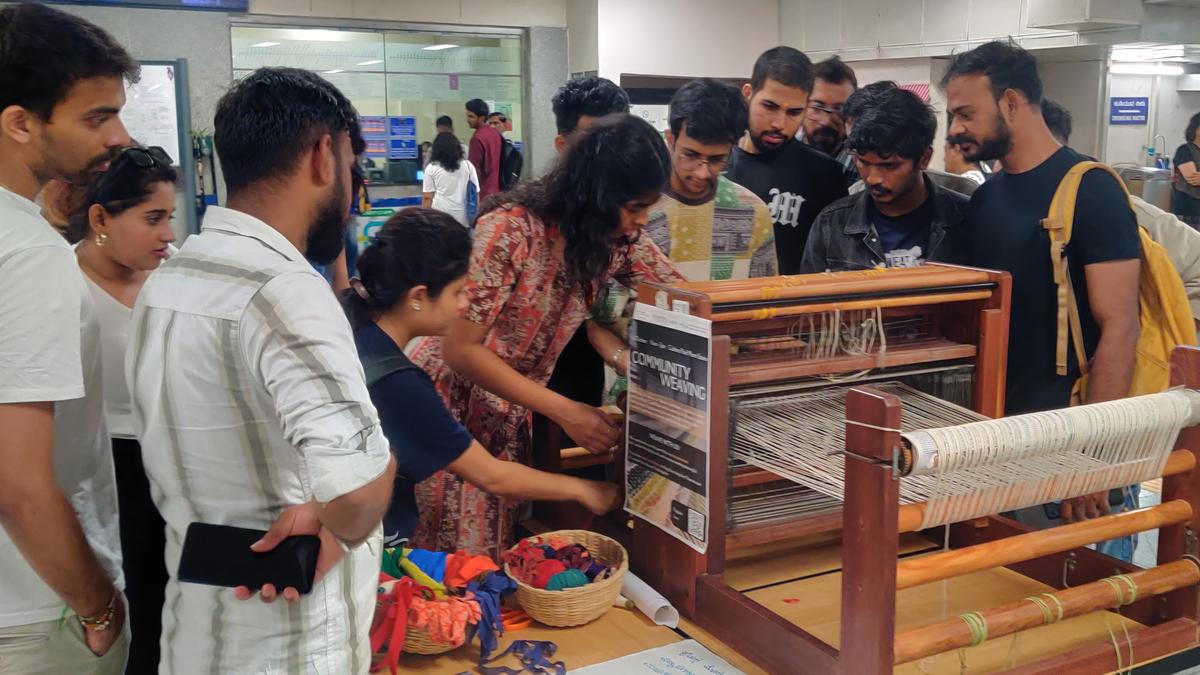
‘Clothes carry our memories and experiences’
The Hindu
Crafting Change initiative by Srishti Manipal Institute of Art reimagines traditional crafts, promotes sustainability, and community engagement.
At the concourse of the Cubbon Park metro station, a half-finished miniature version of the Bhavani Jamakkalam, a traditional woven carpet from Erode, Tamil Nadu, was stretched across the small table loom. Crowds milled around it, wanting to try their hand at weaving, one after the other. Scraps of old fabric were being shuttled across the thick, white threads of the warp, entwining the two into a single integrated varicoloured unit, a reimagination of an ancient craft tradition that has always brought people together.
This community weaving workshop was one of several conducted as part of Crafting Change, an initiative by the Srishti Manipal Institute of Art, Design and Technology hosted under the institute’s Art in Transit initiative, a collaboration with BMRCL. The initiative, which opened in the city on October 2 to mark Gandhi Jayanti, consisted of a series of workshops on mending and eco-printing and two exhibits on Deccani Wool and Brown Cotton, enabling visitors to “immerse themselves in various activities associated with crafting life into textile, mindfully and consciously,” as the event’s release put it.
Sanghamitra M, a fourth-year undergraduate student at the Srishti Manipal Institute of Art, Design and Technology (SMI) who facilitated this community weaving workshop, talks about its raison d’etre. Craft brings people together, so this workshop, which reinterprets an age-old craft tradition, enabled people to appreciate its history and actively participate in creating a new piece that reflects togetherness, says Sanghamitra, who chose to explore the craft of Jamakkalam “because I am from Erode and the jamakkalam is something that I have seen growing up.” s
Not surprisingly, conversations around handloom and handcrafted textiles were crucial to the first edition of Crafting Change on Gandhi Jayanti, offering an opportunity to celebrate the philosophy of khadi and the importance of handmade, self-resilient textile systems. As Yash Bhandari, a faculty member at SMI, says, people often forget that one of the first significant independence movements in this country involved the independent production of cloth, “right from spinning it to weaving and wearing it.” To date, it should be a reminder of the memory and objective of a movement that gave India its identity, he adds.
Swati Maskeri, Head of Studies, Industrial Arts & Design Practices, SMI, who co-curated Crafting Change with Sadhvi Jawa and Saumya Singh, feels the initiative is important for yet another reason: to highlight the wastefulness and harm the textile and fashion industry is causing to the environment.“Art in Transit gave us the scope to bring it out into the public domain and engage the public with these ideas,” she says.
Second edition
Crafting Change, a second edition of which is all set to open on October 19, running between 11 am and 2 pm, has its origins in the seventh-semester pre-thesis project, which every cohort of SMI students has to do. “The project is about looking at the impact that the fashion and textile industry has on the environment,” says Jawa. It is also about examining and rebuilding society’s relationship with clothes, something “fast fashion has reduced,” she says. “The reason why there is so much use-and-throw is that people do not feel connected with their clothes anymore.”













